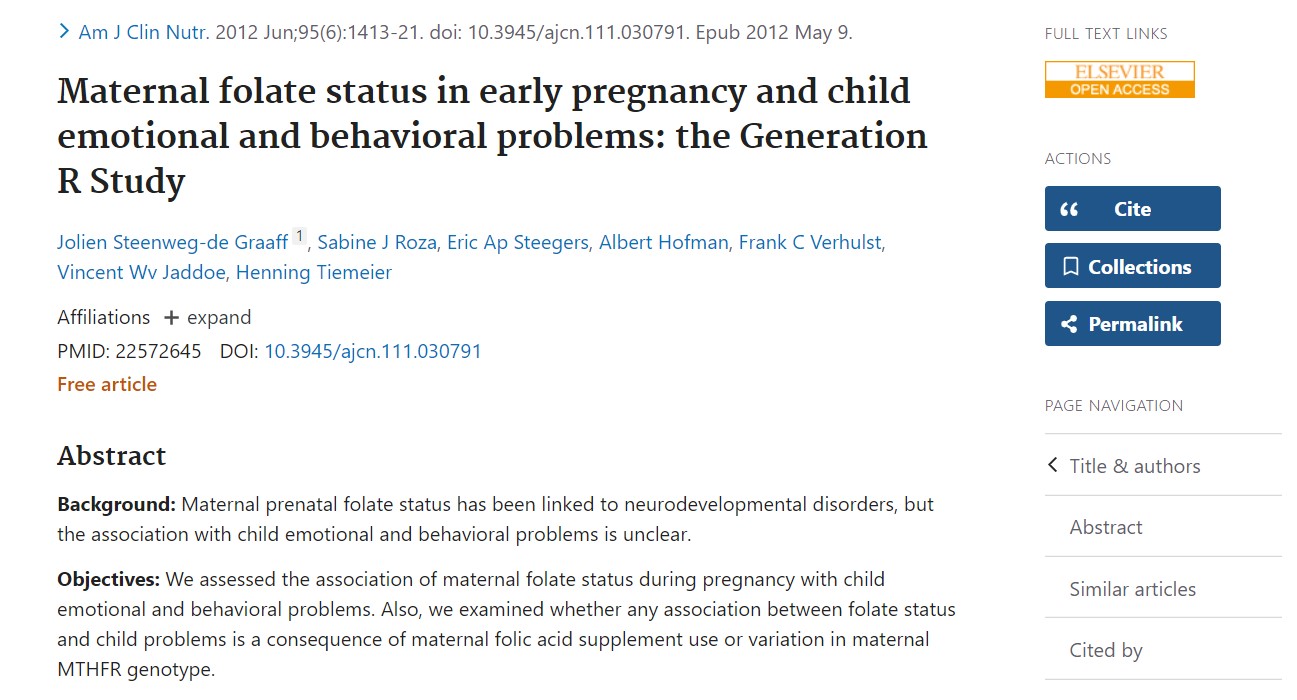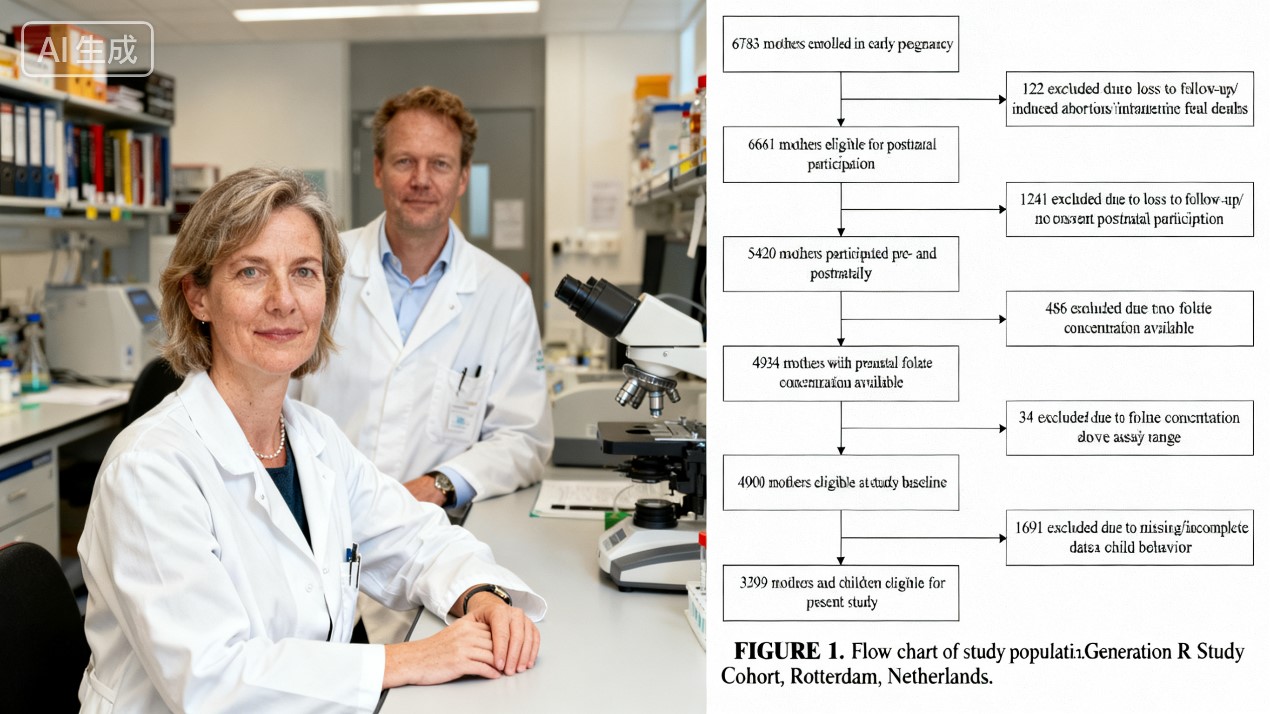In pediatric clinics, we often hear concerns from parents: "Doctor, I didn't take enough folic acid during pregnancy. Could that affect my child's temperament?" What might seem like simple "sensitivity" in a child could potentially be an early sign of emotional difficulties.

As early as 2012, a large-scale study from the Netherlands provided a scientific insight.

This tracking investigation of 3,209 mother-child pairs revealed that if pregnant women had folate deficiency during early pregnancy (plasma folate concentration < 7 nmol/L), the risk of their children developing emotional problems at age 3 increased significantly by 57%.

This study, known as the Generation R cohort study and published in the authoritative American Journal of Clinical Nutrition, highlighted an association between folate and children's emotional development, distinct from its well-known role in preventing neural tube defects.
01 Research Design: Why are these findings reliable?
The Generation R study, conducted by the Erasmus University Medical Center in Rotterdam, Netherlands, is highly regarded due to its multi-level and multi-dimensional rigorous design.

- Diverse Study Population: Initially involving 6,783 women in early pregnancy (<18 weeks), the study completed follow-up with 3,209 mother-child pairs. Participants came from various age groups, nationalities, and educational backgrounds, reducing bias from a homogeneous population and making the results more representative of real-world scenarios.
- Precise Measurements:
- Folate Level Assessment: Venous blood was collected during early pregnancy (median gestational week: 13.1) to precisely measure plasma folate concentration, defining "folate deficiency" as below 7 nmol/L.
- Child Emotion Assessment: When children turned 3 years old, mothers completed the internationally recognized Child Behavior Checklist (CBCL) to objectively assess emotional problems using standardized tools.
- Controlling for Confounding Factors: The data analysis carefully adjusted for over 10 potential confounding variables, including maternal age, education level, and psychological state. Even after these adjustments, the association between folate deficiency and children's emotional problems remained significant (OR=1.57), suggesting folate's effect is independent and not merely due to other social or psychological factors.
02 How does folate affect a child's emotional health?
Research indicates that folate's impact on fetal emotional development may involve two key mechanisms:

- Ensuring Neural Cell Development: As an essential coenzyme for DNA synthesis, folate directly participates in the proliferation and differentiation of fetal nerve cells. The mid-to-late pregnancy stages are periods of active neurological development. Folate deficiency during this time can significantly affect the development of neural pathways related to emotional regulation (such as the limbic system), potentially leading to innate weaker emotional regulation abilities in children after birth.
- Epigenetic Regulation: As an important methyl donor, folate participates in DNA methylation, directly regulating the expression of genes related to emotion. Such epigenetic changes might have long-term and profound effects on a child's mental health.
- Critical Time Window: The study specifically pointed out that folate status in early pregnancy (≤16 weeks) was significantly associated with emotional problems in children at age 3, suggesting this period is a sensitive window for the development of emotional neural circuits and a key time for intervention.
Furthermore, concentration stratification analysis in the study revealed a clear dose-response relationship:
- Significant Impact of Deficiency: When maternal plasma folate concentration fell below 7 nmol/L, the risk of future emotional problems in the child increased by 57%.
- Risk at Low Levels: Even when folate concentration was in the lowest 10%, the risk remained elevated by 39%, indicating a continuous association between folate levels and risk.
Timing of supplementation is crucial: Compared to women who started folate supplementation before pregnancy or within the first 10 weeks of pregnancy, those with insufficient supplementation (starting after 10 weeks or not supplementing at all) had a 45% higher risk of their children developing emotional problems . This strongly suggests that folate supplementation should not only be done but should be started early and be adequate.
03 Scientifically Supplementing with Folate: Avoiding Misconceptions, Choosing the Right Approach
Expectant mothers often encounter cognitive biases that can affect the efficacy of folate supplementation, leading to "missing supplementation" or "ineffective supplementation."

- Misconception ①: Folate only prevents birth defects and has no relation to emotion.
- Incorrect! Folate not only helps prevent neural tube defects through DNA synthesis but is also involved throughout fetal brain development . Early pregnancy folate deficiency (plasma folate <7 nmol/L) can affect the development of emotional regulation neural pathways (like the limbic system), increasing the risk of emotional problems at age 3 by 57% (OR=1.57). It serves as an "early safeguard" for children's emotional health .
- Misconception ②: Taking folate means everything is taken care of.
- Folate is an important factor, but not the only one. The study adjusted for over 10 variables, including maternal education level and psychological state during pregnancy, before confirming its independent association with emotional problems. Therefore, while supplementing with folate, it's equally important to create a stable prenatal environment (e.g., maternal emotion management, optimizing family atmosphere) to build a "comprehensive protective barrier."
So, how can we ensure folate is supplemented "correctly" and "adequately" during the periconceptional period?
First, start folate supplementation at least 3 months before conception (typically 0.4mg/d, or as directed by a doctor for special cases). Considering the research conclusion that "early pregnancy is a sensitive period for neurological development," it is advisable to continue supplementation throughout the entire pregnancy to avoid deficiency during critical stages.

Second, consider choosing active folate (e.g., L-methylfolate) which may be more suitable for many individuals. Synthetic folic acid requires conversion by the MTHFR enzyme to be utilized by the body. However, a significant portion of the population (e.g., studies suggest a high prevalence of MTHFR gene variants in some regions like China) may have reduced enzyme activity, potentially leading to "supplementation without proper absorption" and the risk of unmetabolized folic acid accumulation [Related knowledge]. In contrast, active folate (6S-5-methyltetrahydrofolate) is the form directly used by the body, does not require complex conversion, and can be directly absorbed and utilized. This may lead to more efficient increases in bioactive folate levels and help avoid issues related to poor conversion, potentially more effectively supporting fetal development including emotional health pathways [Related knowledge].
It's evident that from its role as a "basic barrier" against neural tube defects to its function as an "early safeguard" for children's emotional health, the multidimensional value of folate in early life health is strongly supported.

Therefore, it is recommended that women planning pregnancy start folate supplementation before conception — considering forms like active folate for potentially better bioavailability — to provide adequate and sustained folate support for fetal neurological development, including the establishment of emotional regulation pathways.
This scientific nurturing starting from the "beginning of life" can not only reduce the risk of birth defects but also lay a solid foundation for the next generation's mental health, giving babies a "head start in emotional health" from the prenatal period.
【Important Notes & Recommendations】 The research cited here reveals an important association between early-pregnancy folate nutrition and offspring emotional health. However, it is essential to clarify:
- Association does not equal causation: This finding is based on observational data. Child emotional development is influenced by multiple factors including genetics, family social environment, and parenting styles. Folate is an important but not the sole factor.
- Individual differences are common: The research conclusions reflect population trends; the actual impact on individuals varies.
- Actionable advice: We encourage individualized nutrition planning under the guidance of a doctor or clinical nutritionist, combining a balanced diet with scientific supplementation.
References:
[1]Steenweg–de Graaff J, et al. Maternal folate status in early pregnancy and child emotional and behavioral problems: the Generation R Study. Am J Clin Nutr. 2012;95:1413–21.
[2]Lian Zenglin, Liu Kang, Gu Jinhua, Cheng Yongzhi, et al. Biological Characteristics and Applications of Folic Acid and 5-Methyltetrahydrofolate. China Food Additives, 2022, Issue 2.

 Español
Español Português
Português  русский
русский  Français
Français  日本語
日本語  Deutsch
Deutsch  tiếng Việt
tiếng Việt  Italiano
Italiano  Nederlands
Nederlands  ภาษาไทย
ภาษาไทย  Polski
Polski  한국어
한국어  Svenska
Svenska  magyar
magyar  Malay
Malay  বাংলা ভাষার
বাংলা ভাষার  Dansk
Dansk  Suomi
Suomi  हिन्दी
हिन्दी  Pilipino
Pilipino  Türkçe
Türkçe  Gaeilge
Gaeilge  العربية
العربية  Indonesia
Indonesia  Norsk
Norsk  تمل
تمل  český
český  ελληνικά
ελληνικά  український
український  Javanese
Javanese  فارسی
فارسی  தமிழ்
தமிழ்  తెలుగు
తెలుగు  नेपाली
नेपाली  Burmese
Burmese  български
български  ລາວ
ລາວ  Latine
Latine  Қазақша
Қазақша  Euskal
Euskal  Azərbaycan
Azərbaycan  Slovenský jazyk
Slovenský jazyk  Македонски
Македонски  Lietuvos
Lietuvos  Eesti Keel
Eesti Keel  Română
Română  Slovenski
Slovenski  मराठी
मराठी  Srpski језик
Srpski језик 








 Online Service
Online Service